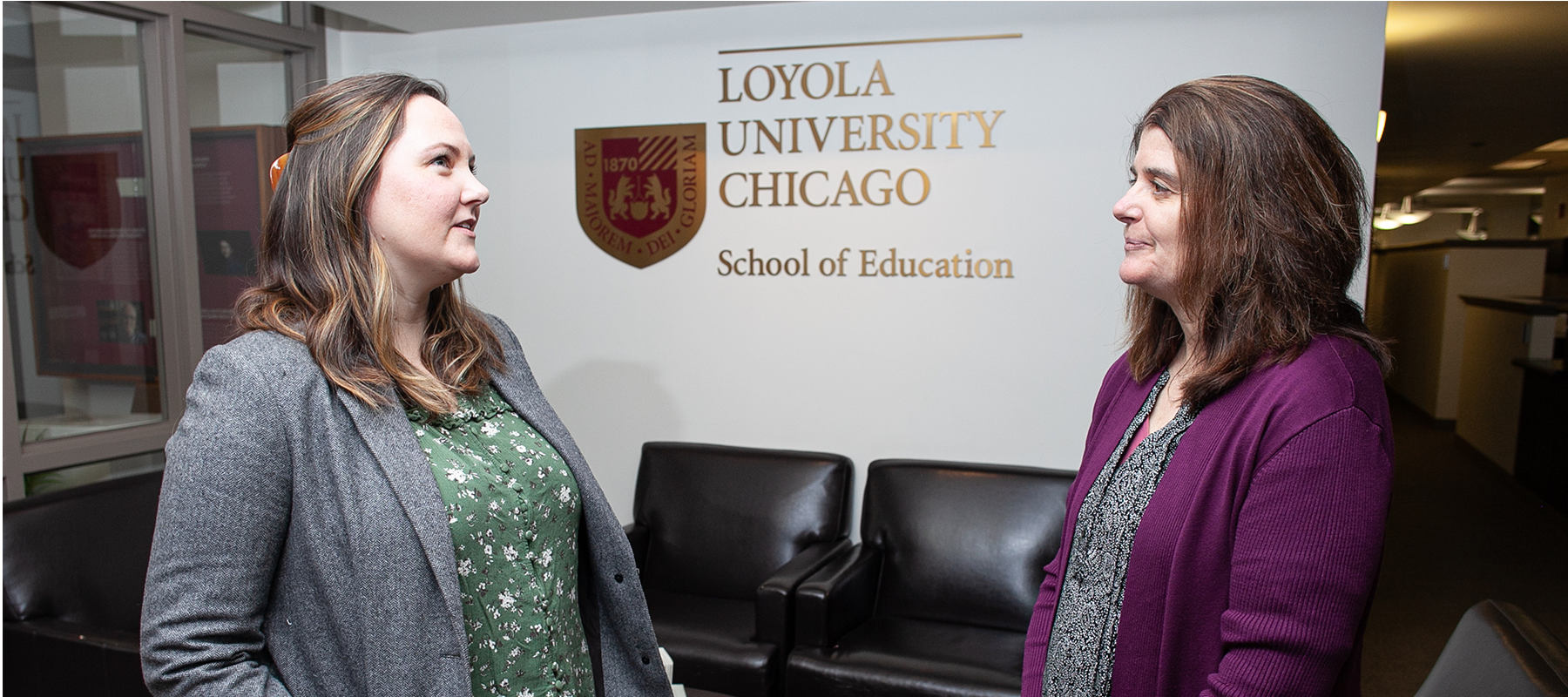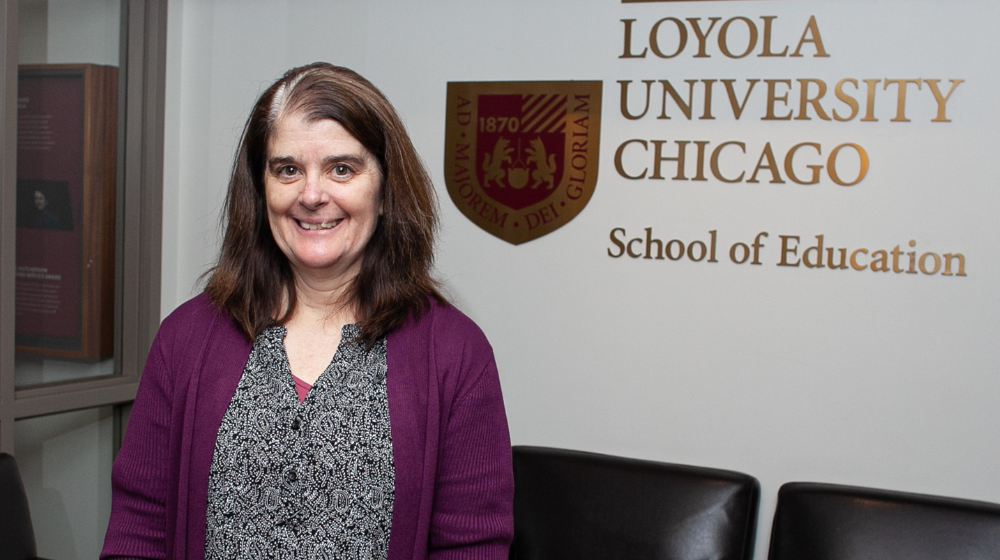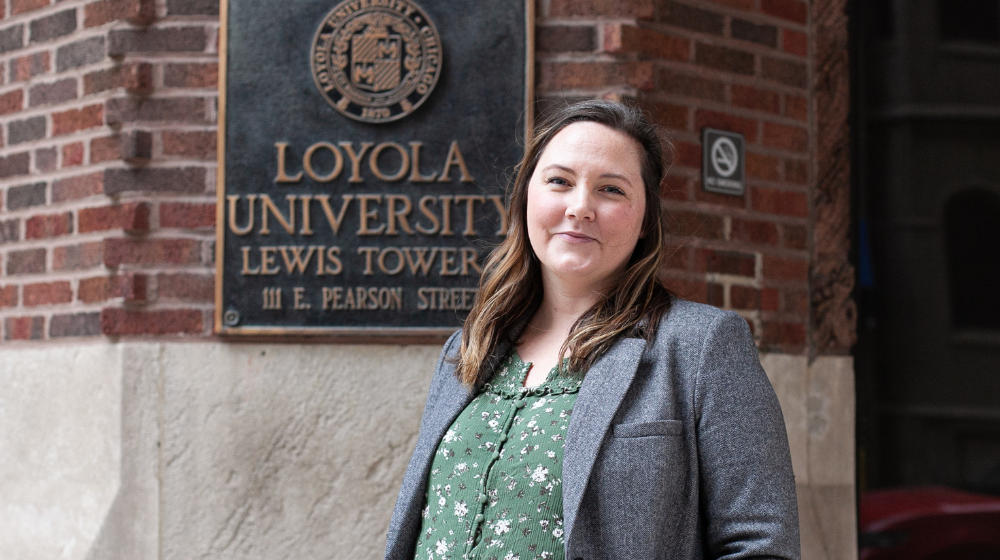
Fostering a spirit of collaboration.
Amidst a national shortage of culturally and linguistically diverse school psychologists, Loyola School of Education faculty aim to alleviate the stressors of this shortage, felt by students and schools, in three Illinois districts.
Loyola’s school psychology program is beginning its 2023 spring semester with a newly awarded $4.5 million grant. This is an unprecedented opportunity, funded by the US Department of Education, that opens the door for the program to live out its mission of diversifying the school based mental health field. The funding of this grant calls the school to action with the founding of the Loyola-Cicero Community School Mental Health Partnership.
"This project design places special emphasis on providing equal access and treatment for the students and families at the partnership’s 22 high-need schools." Dr. Pamela Fenning
The partnership is a five-year collaboration with three Chicago-suburb school districts that serve a total of 19,803 students – Cicero Elementary School District 99, J. Sterling Morton High School District 201, and Berwyn North School District 98 – as well as a local youth serving agency, Youth Crossroads, which aims to remedy the shortage of school psychologists prepared to work in high-needs school districts.
“This project design places special emphasis on providing equal access and treatment for the students and families at the partnership’s 22 high-need schools, especially for those who have been traditionally under-represented based on race, color, national origin, gender, age, or disability,” says Associate Dean for Research Dr. Pamela Fenning.
To accomplish this, Loyola school psychology educational specialist graduate students who come from culturally and linguistically diverse backgrounds or demonstrate a serious commitment to working as school psychologists in high-need districts will receive financial and professional support and be placed into applied training experiences in the partner school districts. Called the Puentes Fellows, these students will participate in unique, targeted training experiences and opportunities focused on serving K-12 students from culturally and linguistically diverse backgrounds.
"Our students learn to conduct research and engage in evidence-based practices through a social justice lens." Dr. Ashley Mayworm
“Consistent with the Loyola mission, our students learn to conduct research and engage in evidence-based practices through a social justice lens in order to create equitable school-based experiences for those who have been historically underserved and marginalized,” says Assistant Professor Dr. Ashley Mayworm.
The creation of the school mental health partnership will benefit both the Chicagoland area communities and districts as well as the Loyola graduate students involved. With an enhanced field-based experience and didactic training, graduate students receive opportunities that few universities can provide, and school districts that struggle with hiring qualified culturally and linguistically diverse school psychologists will now have a pipeline of diverse, eager graduates who are ready to bring about transformative educational experiences for their K-12 students and school communities.
Fenning and Mayworm are optimistic about the future of youth mental health, especially within schools who have the highest needs yet have inequitable access to mental health supports. Graduate students within their program are empowered to be agents of positive social change in the schools and communities where they work and live. Program faculty hope the grant will have a long-term impact with schools and communities. By developing and implementing a School Mental Health Workforce Development program, community youth will experience increased exposure to careers in school mental health, encouraging and helping to create a local pipeline.
Grant funding will support graduate student tuition and fees, faculty salaries, school-based supervisors, community partners, and necessary equipment and additional supplies to reach training goals and ensure the program is functioning at the best possible level.

School Psychology
Dr. Pamela Fenning
Associate Dean for Research
Dr. Fenning is a licensed clinical and psychologist (Illinois) and professor in the School Psychology Program at Loyola University Chicago.
Meet Fenning
School Psychology
Dr. Ashley Mayworm
Assistant Professor
Dr. Mayworm is an assistant professor in the School Psychology program at Loyola University Chicago.
Meet MaywormSchool Psychology
Loyola's school psychology programs are committed to preparing future school psychologists through a close community of learners. Students in our program learn to collaborate with educators, parents, and community members in order to provide high-quality, effective academic, behavioral, and mental health supports to PK-12 students.
Amidst a national shortage of culturally and linguistically diverse school psychologists, Loyola School of Education faculty aim to alleviate the stressors of this shortage, felt by students and schools, in three Illinois districts.
Loyola’s school psychology program is beginning its 2023 spring semester with a newly awarded $4.5 million grant. This is an unprecedented opportunity, funded by the US Department of Education, that opens the door for the program to live out its mission of diversifying the school based mental health field. The funding of this grant calls the school to action with the founding of the Loyola-Cicero Community School Mental Health Partnership.
The partnership is a five-year collaboration with three Chicago-suburb school districts that serve a total of 19,803 students – Cicero Elementary School District 99, J. Sterling Morton High School District 201, and Berwyn North School District 98 – as well as a local youth serving agency, Youth Crossroads, which aims to remedy the shortage of school psychologists prepared to work in high-needs school districts.
“This project design places special emphasis on providing equal access and treatment for the students and families at the partnership’s 22 high-need schools, especially for those who have been traditionally under-represented based on race, color, national origin, gender, age, or disability,” says Associate Dean for Research Dr. Pamela Fenning.
To accomplish this, Loyola school psychology educational specialist graduate students who come from culturally and linguistically diverse backgrounds or demonstrate a serious commitment to working as school psychologists in high-need districts will receive financial and professional support and be placed into applied training experiences in the partner school districts. Called the Puentes Fellows, these students will participate in unique, targeted training experiences and opportunities focused on serving K-12 students from culturally and linguistically diverse backgrounds.
“Consistent with the Loyola mission, our students learn to conduct research and engage in evidence-based practices through a social justice lens in order to create equitable school-based experiences for those who have been historically underserved and marginalized,” says Assistant Professor Dr. Ashley Mayworm.
The creation of the school mental health partnership will benefit both the Chicagoland area communities and districts as well as the Loyola graduate students involved. With an enhanced field-based experience and didactic training, graduate students receive opportunities that few universities can provide, and school districts that struggle with hiring qualified culturally and linguistically diverse school psychologists will now have a pipeline of diverse, eager graduates who are ready to bring about transformative educational experiences for their K-12 students and school communities.
Fenning and Mayworm are optimistic about the future of youth mental health, especially within schools who have the highest needs yet have inequitable access to mental health supports. Graduate students within their program are empowered to be agents of positive social change in the schools and communities where they work and live. Program faculty hope the grant will have a long-term impact with schools and communities. By developing and implementing a School Mental Health Workforce Development program, community youth will experience increased exposure to careers in school mental health, encouraging and helping to create a local pipeline.
Grant funding will support graduate student tuition and fees, faculty salaries, school-based supervisors, community partners, and necessary equipment and additional supplies to reach training goals and ensure the program is functioning at the best possible level.
